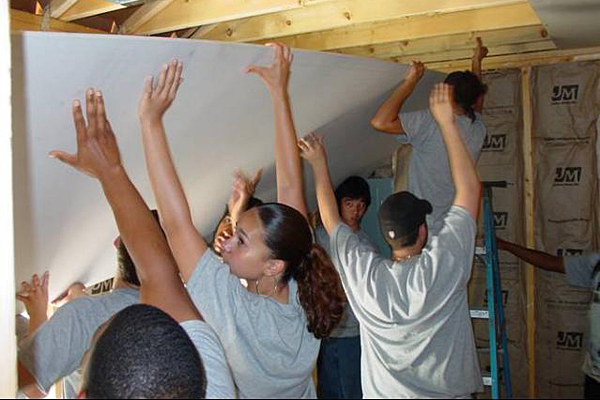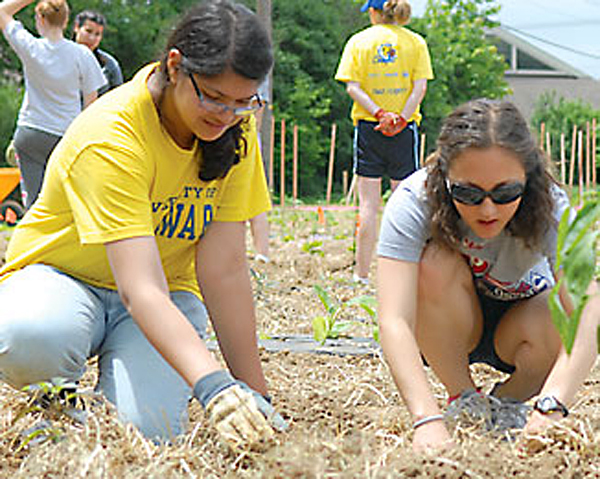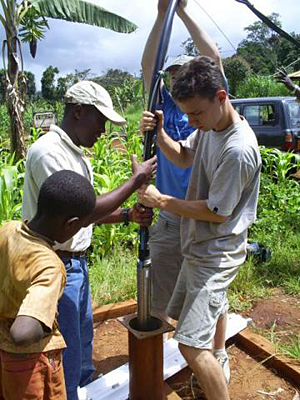Service learning’s economic impact
UD community engagement contributes more than $6.7 million annually
2:12 p.m., April 7, 2011--Through volunteerism and service learning, University of Delaware students and faculty members contribute more than $6.7 million in annual goods and services to the national economy and provide more than $1.4 million in free labor, according to a new study that measured the economic impact of community engagement.
The study -- conducted by William Latham and Kenneth Lewis, economics professors and directors of the Center for Applied Business and Economic Research -- also found that involvement in service learning may increase lifetime earnings for those participating students in the Class of 2011 by more than $50 million as a result of quicker entry to the workforce, higher starting salaries and more rapid career advancement.
Campus Stories
From graduates, faculty
Doctoral hooding
The increased lifetime earnings for students involved in service learning over seven graduating classes -- from 2010 to 2016 -- could be greater than $395 million.
“Employers recognize UD as a Citizen University,” says Matthew Brink, director of the University’s Career Services Center, “and Discovery Learning translates to better jobs for our graduates.”
Brink cites both anecdotal evidence and national statistics, which estimate starting salaries to be approximately $5,000-8,000 higher for students who participate in experiential learning, as proof that “it pays to serve.”
Out-of-classroom learning encompasses many types of service. Service learning combines academic study with larger societal needs, while volunteerism provides enthusiastic but limited service, with no academic content. Community-based research, meanwhile, combines research, teaching and service to address larger issues in the community.
“We often think in terms of the intangible benefits of public service, and we all know of the mutual benefits of partnering with the community,” said Lynnette Overby, professor and faculty director of the Office of Undergraduate Research and Experiential Learning. “This economic impact study demonstrates the wide reach of the University and shows that we offer more than just service.”
Last year, approximately 12,000 students, or more than half the University’s student population, volunteered more than 160,000 hours of their time by participating in service learning, community-based research and volunteer projects.
Their work -- which ranged from 500 hours of landscape design and groundskeeping services by horticulture students to free tax preparation for low-income individuals by 115 students in an accounting course -- translated to nearly 62 full-time jobs.
To measure the economic impact of service learning and volunteerism, economists Latham and Lewis analyzed the number of students participating in service learning and volunteer projects, the number of hours spent on each project, the specific activities performed and the amount of funds raised.
The data, provided by the Office of Undergraduate Research and Experiential Learning, included volunteer projects conducted during the first-year residence halls’ Day of Service, volunteer and philanthropy work reported by fraternities and sororities and other community-based projects within the office.
The researchers expect that economic impact would be even higher if more organizations participating in service learning and volunteerism recorded and tracked their data, highlighting the prevalence of civic engagement on campus.
“Among the University’s greatest strengths is its long and vibrant tradition of public service,” said President Patrick Harker in a message on the newly designed UDengage website, which was developed to showcase the various service learning opportunities in each college and to educate students and professors on the benefits of community-based research.
The website highlights the diverse service learning opportunities available to students, such as the Garden for the Community project, in which staff and staff-supported volunteers within the College of Agriculture and Natural Resources grow vegetables, herbs and fruits for the Food Bank of Delaware to distribute through the state, or the Management Information Systems capstone course, a project in which senior business majors provide 500-750 hours of consulting services, many of which are to local agencies and have included projects such as redesigning the intake process for the Delaware SPCA or developing a digital card catalog for the Delaware Museum of Natural History.
Article by Artika Rangan













